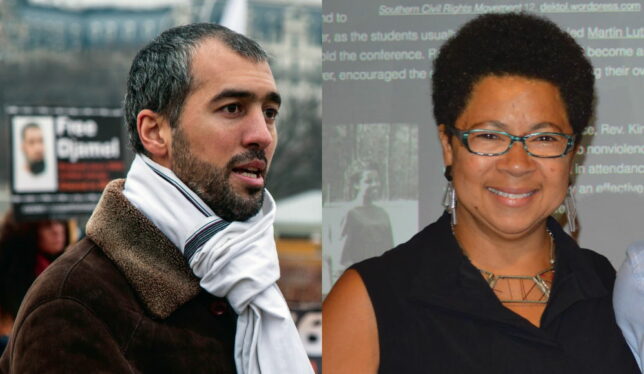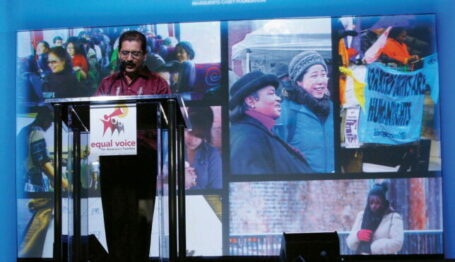Foundation Watch
The Marguerite Casey Foundation: Left-Wing Grantmaking
Big Philanthropy’s Most Radical Foundation?
 Ramzi Kassem (left) and Barbara Ransby (right)
In 2020, the Marguerite Casey Foundation started a major new grantmaking program called Freedom Scholars, through which it awards unrestricted $250,000 lump sums to left-wing activist-academics whom the foundation considers to be “social justice leaders.” Two of the recipients were Ramzi Kassem and Barbara Ransby. Credit: Justin Norman/teachingforchange. License: https://shorturl.at/fCGNO and https://shorturl.at/psuZ6.
Ramzi Kassem (left) and Barbara Ransby (right)
In 2020, the Marguerite Casey Foundation started a major new grantmaking program called Freedom Scholars, through which it awards unrestricted $250,000 lump sums to left-wing activist-academics whom the foundation considers to be “social justice leaders.” Two of the recipients were Ramzi Kassem and Barbara Ransby. Credit: Justin Norman/teachingforchange. License: https://shorturl.at/fCGNO and https://shorturl.at/psuZ6.

The Marguerite Casey Foundation: Big Philanthropy’s Most Radical Foundation? (full series)
“Social Justice Philanthropy” | A Focus on Group Identity
Left-Wing Grantmaking | Thoughts and Questions
Left-Wing Grantmaking
Every year, the Marguerite Casey Foundation distributes tens of millions of dollars to nonprofits organized as public charities under Section 501(c)(3) of the Internal Revenue Code. Yet at the same time, its grantmaking is overwhelmingly directed at advancing left-wing societal changes and public policy priorities. This in turn reflects the importance of 501(c)(3) groups to such activism—something that likely runs counter to most Americans’ conception of “charity.”
Indeed, the Marguerite Casey Foundation’s approach often appears openly political and sometimes virtually impossible to separate from electoral outcomes. Rojas herself has conceded that “politics is central to the work of making change” and has strongly hinted at her specific political preferences. During the runup to the 2020 presidential election, she co-authored a remarkable op-ed claiming that “over the last three and a half years [i.e., the Trump Administration], seeds planted by conservatives, the far right, and corporate and political elites” had given rise to what she called an “emerging authoritarianism.” She chastised institutional philanthropy for treating “this election season like any other” and urged it to start supporting “countervailing forces” to this alleged authoritarianism. The op-ed finished by calling on philanthropy to rally around “a loud NO to authoritarianism and a generous YES to funding the people power that will save and rebuild our democracy”—phrasing that does not seem terribly hard to decipher, given the explicitly electoral context.
As 501(c)(3) organizations themselves, private foundations are categorically prohibited from directly or indirectly intervening in electoral outcomes. In practice, the lines can be very blurry, and the Marguerite Casey Foundation appears to have no qualms about existing within the fog. After Joe Biden was elected president in 2020, the foundation released a statement claiming that “this election has always been about the critical need for an administration that will consent to shift the balance of power towards regular working class folks and families” and that President Biden’s election represented an opportunity “to truly reimagine what our democracy should look like.” Again, it is difficult to interpret this statement in any way other than as approving of a specific candidate’s electoral victory.
The Marguerite Casey Foundation also highlights the election-related work of its grantees. On its website homepage, it features a quote explaining that one grant recipient’s purpose is “larger than one election” and that its work helps people exercise “their right to determine how their cities, their states, and their communities are shaped and represented for generations to come.” Elsewhere, it even spotlights its funding for the 501(c)(3) nonprofit Florida Rising Together by quoting the mission of the group’s 501(c)(4) affiliate, which boasts of its efforts “to win elections.” That is an exceedingly unorthodox phrase for a private foundation to feature on its website, to say the least.
As of March 2024, the Marguerite Casey Foundation’s website listed 55 nonprofit grant recipients that it described as forming its “core grantmaking.” Nearly every one of them could most accurately be characterized as a left-of-center activist/public policy advocacy group. These grantees were spread across just 19 states, with nine of them located in Illinois, nine in Washington, seven in Georgia, and five each in Texas and New Mexico. Many specifically identify with a certain race or ethnicity, sexual orientation, immigration status, or several of these categories. Some larger representative grantees include Southerners on New Ground, the Texas Organizing Project Education Fund, and the Power Coalition for Equity and Justice—each of which received over $1.3 million from 2020 to 2022.
An examination of recent tax filings further illustrates the Marguerite Casey Foundation’s far-left grantmaking priorities:
From 2020 to 2022, it gave over $4.5 million to projects housed at the Tides Foundation or the affiliated Tides Center. Of this, over $1.5 million was earmarked for a radical Florida-based activist group called Dream Defenders. Describing itself as a “revolutionary” organization that aims to replace what it calls the “capitalist police state” with a government based on “the Socialist ideal,” Dream Defenders attacks the United States as “the belly of the beast…an empire that uses war to expand territory and power.” Dream Defenders aspires to a utopian fantasy world “without prisons, policing, surveillance and punishment,” in which a socialist government guarantees housing, food, health care, education, clothing, and more to everyone.
In 2022, it gave $1.5 million to support the Portal Project of the Social Justice Initiative at the University of Illinois Chicago, which purportedly seeks to answer questions such as “what would an ‘abolitionist’ society look like?” and “what is the relationship of capitalist extraction to the climate crisis?” and “what can we learn from cooperatives and solidarity economies?” The Social Justice Initiative is led by Barbara Ransby, herself an inaugural 2020 Marguerite Casey Foundation Freedom Scholar. The Portal Project’s conclusions were to be released through a partnership with Haymarket Books, a self-described radical publisher that also received a separate $1.6 million from the Marguerite Casey Foundation that year—money that went to support Haymarket’s efforts “to advance political education projects linked to grassroots organizing.”
That same year, the foundation gave an additional $1.5 million to the UCLA Luskin Institute on Inequality and Democracy, another far-left university organ active on everything from what it calls “market-led and state-organized housing precarity” to the “exploitative financial relationships” that supposedly intersect with “racial capitalism, imperialism, settler colonialism, neocolonialism, and climate catastrophe” to “the present historical moment of resurgent white nationalism and xenophobia.” The Luskin Institute is also led by a Marguerite Casey Foundation Freedom Scholar—Ananya Roy—who is described as a “scholar of global racial capitalism and postcolonial development” and whose work focuses on “the transformation of the public university…so that it can be a force for social justice.”
In 2022, the Marguerite Casey Foundation gave $1 million to the Arabella Advisors–managed New Venture Fund, three-quarters of which was earmarked for a group called the Black Radical Project, which produces a revolutionary Marxist online publication called Hammer & Hope. Drawing inspiration from the Black Panther Party and with a self-described focus on “Black politics and culture with roots in radical political traditions,” Hammer & Hope’s name was derived from the Communist Party’s activities in the mid-20th century American South and ultimately from the Bolshevik hammer and sickle—though the publication’s pages openly debate whether the “masculinist” hammer remains a suitable symbol for the modern proletariat. Four of the nine editorial positions at the magazine are occupied by individuals who have personally received one of the Marguarite Casey Foundation’s Freedom Scholar awards, including editor-at-large Keeanga-Yamahtta Taylor.
From 2021 to 2022 the foundation gave a total of $1 million to the major left-wing passthrough Borealis Philanthropy. Half was earmarked for the Communities Transforming Policing Fund, a donor collaborative that boasts of having funneled more than $20.7 million to anti-police campaigns nationwide. The fund is aimed squarely at “reducing the size, scope, and role of police,” and it refuses to support academic research, police training, or any form of direct services that are not “connected to advocacy/organizing to address systemic issues.” Its ideological proclivities are aptly illustrated by the fact that it lists the Revolutionary Black Panther Party as one of the groups it was “honored to support” in 2023.
Indeed, anti-police grantmaking appears to be something of a focus for the Marguerite Casey Foundation. In 2021 it gave $200,000 to a group called the Black Abolitionist Network, which the year before had hosted training sessions on defunding the Chicago Police Department—in a city infamous for its struggles with violent crime. That same year it gave $100,000 to the California-based Black Organizing Project, which has advocated for total police abolition. In 2022, the foundation gave $250,000 to support the rather self-explanatory National Campaign for Police Free Schools.
In the next installment, the Marguerite Casey Foundation is one of the most radical and thoroughly politicized major grantmaking foundations in the United States.



